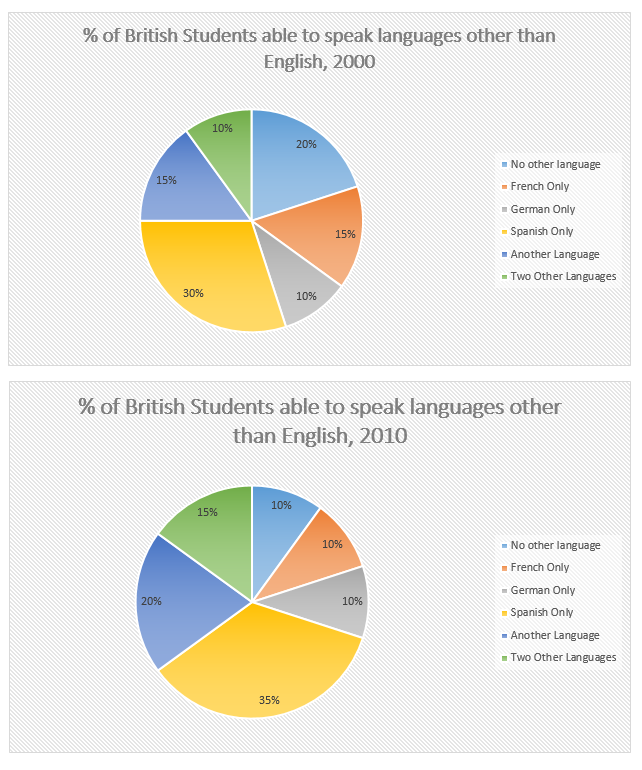IELTS Writing Task 1 AC – Pie Charts – British Students 2000-2010
IELTS Academic Writing Task 1: British Students 2000 and 2010
IELTS WRITING TASK 1 – Academic
The charts below show the proportions of British students at one university in England who were able to speak other languages in addition to English, in 2000 and 2010.
Summarise the information by selecting and reporting the main features, and make comparisons where relevant.

Write at least 150 words.
Data Type: Pie Charts
Time: Past Tense
Version 1
- Introduction + Overview
- 2000
- 2010
The first pie chart compares the percentages of British students who can communicate in languages other than English in 2000, while the second chart shows the changes a decade later. Overall, there was a decrease in the number of monolingual students, and those who could speak Spanish remained the highest in both years.
In 2000, 10% of British students were proficient in German and two other languages each, while 15% were bilingual in French and another language. About 30% of these students were able to articulate in Spanish.
After a decade, the percentage of monolingual students who could only converse in English, as well as those who spoke French, decreased to 10% each. German-speaking students remained at 10%. There was a 5% increase in the number of students who spoke other languages, including bilingual students who could speak two languages other than English. The percentage of students who could speak Spanish rose to 35%.
Version 2
The first pie chart compares the percentages of British students who can communicate in languages other than English in 2000, while the second chart shows the changes a decade later. Overall, there was a decrease in the number of monolingual students, and those who could speak Spanish remained the highest group in both years.
In both 2000 and 2010, a tenth of British students was proficient in German, while the percentage of monolingual students who only spoke English decreased from 20% to 10% over the decade. A similar trend was observed for French-speaking students, with the percentage dropping from 15% to 10% after ten years.
The percentage of students who were proficient in other languages slightly increased from 15% to 20%, and those who were trilingual and could speak two other languages in addition to English increased from a tenth in 2000 to 15% in 2010. The largest group was bilingual students who spoke English and Spanish, accounting for 30% in 2000 and reaching 35% in 2010.
Check my other IELTS Writing.
Check my website.

Ian Tanpiuco is an ESL and virtual assistant. With a decade of experience, he has become an expert in his field. Dedicated to helping others achieve their goals, Ian works tirelessly in the classroom or as a virtual assistant.






